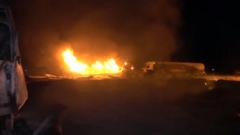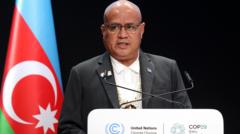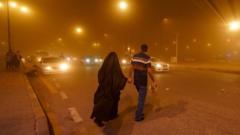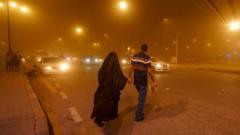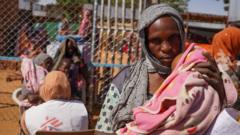Recent torrential rains have led to flooding in Kinshasa, resulting in dozens of deaths, widespread damage to homes, and mass displacements. The government acknowledges the situation's severity as climate-related disasters escalate across Africa.
Dozens Feared Dead as Floods Devastate Kinshasa

Dozens Feared Dead as Floods Devastate Kinshasa
Severe flooding in the Democratic Republic of Congo's capital causes enormous destruction and multiple fatalities.
The Democratic Republic of Congo's capital, Kinshasa, has faced devastating floods following days of torrential rain, with reports indicating that at least 33 people have died and countless others have been displaced. The Ndjili River overflowed, inundating major thoroughfares, including the crucial Lumumba Boulevard, which leads to the airport. Government sources estimate that hundreds of homes were destroyed in the disaster, and the death toll is expected to rise as water levels recede.
The nation is grappling with increasing occurrences of severe floods and droughts, attributed to climate change. In recent years, the Democratic Republic of Congo has witnessed alarming trends, with more than 400 people succumbing to floods in 2023 and over 300 fatalities recorded in the deadliest floods of 2024. Environmental scientists emphasize that this phenomenon reflects an urgent crisis affecting numerous African nations, warning that rapid climate change is exacerbating risks to vulnerable communities.
Local resident Denise Sukali, 45, shared her harrowing experience, stating, "We just managed to save our lives." Forced to take refuge in a church with her children, she lamented her submerged home. President Felix Tshisekedi visited affected regions, vowing to provide food aid and assistance for displaced individuals, attributing the tragedy in part to unregulated settlements built in high-risk areas.
Beyond the immediate effects of flooding, Congo is entangled in a challenging humanitarian landscape marked by decades-long conflicts in its eastern regions, which have reignited this year, resulting in thousands of casualties and displacing nearly seven million people. In response, humanitarian aid efforts have been extensive, with the United States contributing $910 million in 2024 towards essentials like food and shelter. However, changes in foreign aid could jeopardize survival for millions, especially children at risk of malnutrition.
As Kinshasa grapples with this calamity, the government and humanitarian organizations face a daunting task of recovery in a nation already strained by ongoing crises.
The nation is grappling with increasing occurrences of severe floods and droughts, attributed to climate change. In recent years, the Democratic Republic of Congo has witnessed alarming trends, with more than 400 people succumbing to floods in 2023 and over 300 fatalities recorded in the deadliest floods of 2024. Environmental scientists emphasize that this phenomenon reflects an urgent crisis affecting numerous African nations, warning that rapid climate change is exacerbating risks to vulnerable communities.
Local resident Denise Sukali, 45, shared her harrowing experience, stating, "We just managed to save our lives." Forced to take refuge in a church with her children, she lamented her submerged home. President Felix Tshisekedi visited affected regions, vowing to provide food aid and assistance for displaced individuals, attributing the tragedy in part to unregulated settlements built in high-risk areas.
Beyond the immediate effects of flooding, Congo is entangled in a challenging humanitarian landscape marked by decades-long conflicts in its eastern regions, which have reignited this year, resulting in thousands of casualties and displacing nearly seven million people. In response, humanitarian aid efforts have been extensive, with the United States contributing $910 million in 2024 towards essentials like food and shelter. However, changes in foreign aid could jeopardize survival for millions, especially children at risk of malnutrition.
As Kinshasa grapples with this calamity, the government and humanitarian organizations face a daunting task of recovery in a nation already strained by ongoing crises.


